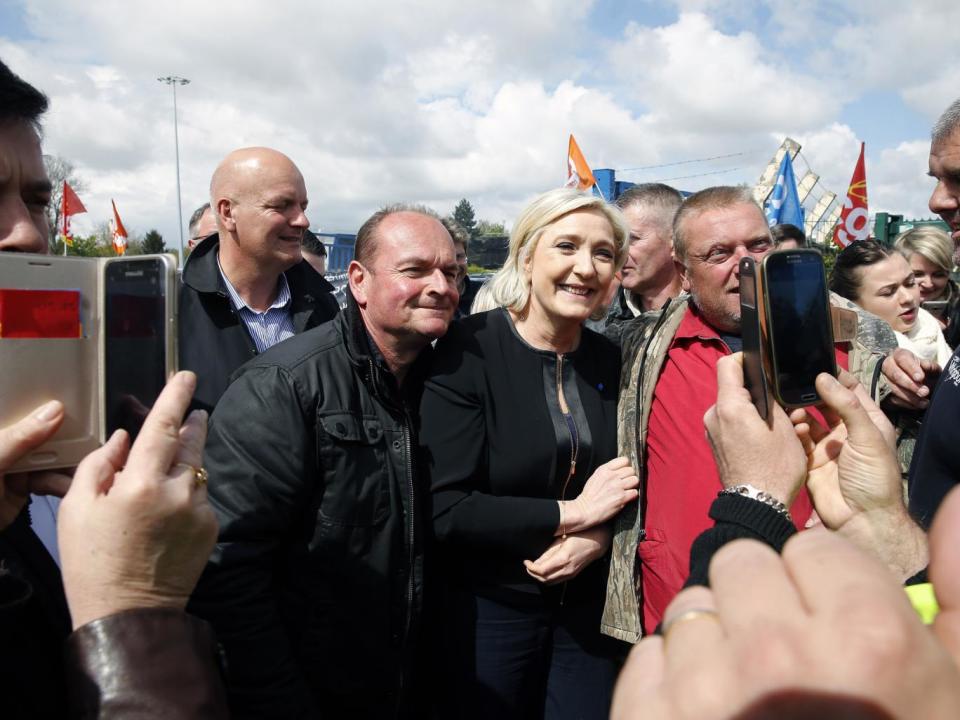Marine Le Pen sets pace in French election second round amid concern over Emmanuel Macron 'smugness'

Emmanuel Macron risks lagging behind Marine Le Pen on the the final leg of the French presidential campaign, with the far-right candidate setting the pace and the agenda.
The frontrunner was seen heckled by workers on strike over the relocation of their factory to Poland shortly after a visit by his far-right rival Ms Le Pen.
Mr Macron had to answer tough questions on his pro-Europe stance after being upstaged by Ms Le Pen, who turned up unexpected at the factory, which is located in an area where voters largely support her.
This marked a difficult start for Mr Macron ahead of the election’s second round, after he took a 48 hour break away from the campaign trail and has been accused of “smug” celebrations following his first-round victory.
On the night of the first results, Mr Macron’s celebratory dinner in a typical Parisian brasserie was not lavish but did no good for his efforts to win the votes of France’s working people.
The move played into the hands of Ms Le Pen’s populist image, with French commentators warning Mr Macron should not be “too confident” of his success in the final showdown on 7 May.
Meanwhile, Ms Le Pen has been seen to set the pace in the final leg of the campaign, with a successful communication coup cutting short her rival.
Mr Macron had planned to chase blue collar votes on Wednesday by visiting the Whirlpool home appliances plant in Amiens, in the Somme in northern France.
Although Amiens is Mr Macron’s hometown, Ms Le Pen swept to victory in the region on Sunday with 23.77 per cent of the votes, in an area where unemployment reaches 13 per cent.
But while Mr Macron was meeting a delegation of unionists in the city centre, Ms Le Pen made a surprise visit to the Whirlpool workers on the picket line, opposing closure of the plant next year by its US owners.

Throughout the campaign, the future of the plant has been the focus of the debate around globalisation and a symbol of French jobs being lost to cheaper labour abroad.
Speaking at the Whirlpool factory, Ms Le Pen told journalists she left a strategic meeting in Paris to “meet with the workers on the picket line”.
She said Mr Macron’s visit was not the reason she decided to go, yet she slammed the centrist candidate’s decision to speak to union leaders in the city centre as “a proof of disdain for the employees”.
Impressed by Ms Le Pen's surprise visit, one of the workers told French television channel BFM TV that he thought Mr Macron “lacked courage” to address the workers directly.
Ms Le Pen pledged to keep the plant open if she is elected president, come what may.

Speaking at a press conference in Amiens, Mr Macron accused Ms Le Pen of using the situation in Whirlpool to “serve her political ends”.
He said he would examine all options to keep the plant open but refused to make promises he could not hold.
After being criticised for not campaigning on the ground since Sunday night, Mr Macron followed Ms Le Pen and met some of the workers in what turned out to be a largely chaotic and disorganised event.
The encounter, which was live streamed on Mr Macron’s Facebook page, saw the presidential candidate in a crowd of workers vividly answering questions about the impact of globalisation on the French labour market.
One man said he recognised Mr Macron’s “courage and boldness” to address them that way but criticised him for not having visited the plant before.
It has proved difficult for Mr Macron to make his pro-Europe programme appealing to the workers, who are expecting strong measures to tackle chronic unemployment.
On his first day back in the campaign swing, Mr Macron, who has never run in a presidential election before, was caught off guard and has been mainly reacting to the anti-Europe and globalisation agenda set by Ms Le Pen.
Speaking to reporters, Mr Macron said politicians and the media had “normalised” Ms Le Pen’s programme and that he would unite France by welcoming people from the right and the left to rally around his project.
This comes after far-left candidate Jean-Luc Melenchon, who received 19.3 per cent of the votes in the first round of the election, refused to call on his supporters to vote for either candidate in the second round.
This has come as a blow to Mr Macron, who will need the votes from the far-left candidate to secure his place at the Elysée Palace. Some far-left voters could be attracted to Ms Le Pen’s anti-globalisation programme, which echoes some of Mr Melenchon’s views.
Mr Macron said: “I respect Mr Melenchon but I believe his voters deserve better than this and I was expecting something else from him.”
Former right-wing president Nicolas Sarkozy said he would vote for Mr Macron in order to prevent Ms Le Pen from winning.
Some senior conservative politicians, such as former finance minister in Mr Sarkozy’s administration, Francois Baroin, publicly said he was ready to work as prime minister in a “cohabitation” arrangement with Mr Macron.
More moderate conservatives loosely gathered under the banner of Alain Juppe have suggested they would join a majority and support Mr Macron.
The polls still give Mr Macron as winner of the election with around 60 per cent of the vote, compared with 40 per cent for Ms Le Pen.

 Yahoo News
Yahoo News 
